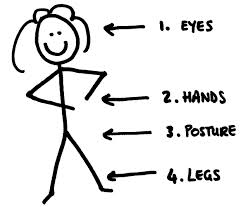leadership qualities
Leaders Are Listeners: 10 Easy Steps to Effective Listening Skills
When you think of people you like to hang out with, chances are, one of their qualities is that they are good listeners. In the age of technology, listening is becoming a lost art. It’s easy to let the pseudo-communication of social media and texting replace real conversations.
But, leaders are listeners.
When you listen, you learn. And it shows people that what they have to say is important. Think about it. The people who listen to us are the ones we move toward. When we are listened to, it validates us and helps us open our minds.
To enhance the human connection on your campus, show some leadership and follow these strategies to better listening.
1. Listen, listen, listen.
Just like you’d get yourself in the mental mode to play your favorite sport, take a test, or drive a car, it’s important that we mentally prepare ourselves to listen. Listening takes discipline – similar to training for your sport, studying for a test or learning to drive! So practice with intention.
2. Get rid of distractions.
 Put away your smartphone. Period.
Put away your smartphone. Period.
It’s a drag when someone feels like anything and everything else is more important than the person standing in front of them.
If you’re in a crowded, noisy place (such as a party or game) and it’s an important conversation, ask to move somewhere that’s quieter.
3. Don’t judge too early.
It’s easy to jump to conclusions before we have heard the whole story. Listening is also about waiting and patience (remember how it’s a discipline?) Don’t feel bad if you’re not in complete agreement with the other person. Leaders acknowledge and respect others’ views.
4. Ask questions.
When you ask questions, you convey genuine interest. It makes people feel good. Meaningful questions help a conversation take on more depth, and you create a rapport and trust with the other person. And – leadership is about gaining the trust of others.
5. Focus on key ideas – and what isn’t said out loud.
Instead of drifting off in boredom, listen for and extract the central idea.
This means to pay close attention to what is being said beneath the words. Focus on what’s NOT being said, too. Interpreting another person’s tone and feelings takes some observation and insight.
6. Don’t forget about body language.
Great listening skills go beyond what your ears are doing. Face the other person, maintain eye contact, and nod your head to demonstrate you’re fully committed to the conversation.
7. Suspend your own agenda.
Often, instead of listening to what’s actually being said to us, we mentally formulate our response. It’s hard, but focus on the speaker’s words and forget about your stuff. Sometimes, people don’t want advice. They just want a listening ear.
8. Empathize.
Consider the speaker’s point of view as if their concepts were your own. Empathy places you in the other person’s shoes and helps you gain a sense of their feelings and experiences. It’s not easy, but you’re practicing!
9. Acknowledge their point of view is valid.
People are different. We often don’t agree with others, but great listening includes acknowledgement. Their point of view is just as important and worthy as our own. Remember, everyone wants to feel important!
10. Paraphrase.
Repeat back the speaker is saying to make sure you’ve understood. This also demonstrates attentive listening. For example,
“So you’re telling me that you think my employee evaluation process is unfair?”
“Oh… so you hate the music we play at our dances?”
That’s it! Practice these listening techniques throughout your week and let me know how it goes.
Or, if I’ve missed one, please let me know in the comments section below. Thanks!
How To Set Goals | Quality #4: Make Your Goals Personal
“Don’t be trapped by dogma—which is living with the results of other people’s thinking. Don’t let the noise of other’s opinions drown out your own inner voice. And most important, have the courage to follow your heart and intuition. They somehow already know what you truly want to become. Everything else is secondary.” — Steve Jobs
Making your goal personal means you need to strive for something you believe in and is meaningful to you. You’ve got to own your goal. This detail is crucial to the success of your goal. Your goal should not reflect what your parents, teachers, or family want for you, unless you truly want that same thing.
Again, this is why it’s imperative to know yourself, your strengths/weaknesses, likes and dislikes. Trying to achieve a goal that is not meaningful to you will result in dissatisfaction, or even failure.
Allow me to share a story that illustrates this point.
Ashley was one of my closest friends from high school. She was a talented artist and amazing photographer. Not surprisingly, Ashley’s dream was to be a graphic designer. Her parents, however, had a different plan. They viewed such a career as unstable and impractical, and they steered her away from art. When Ashley went to college, she majored in accounting. As her friend, I knew this was one of the last careers that would interest her. She explained she was doing this to make her parents happy.
 Three years into her accounting career, Ashley finally admitted to herself and her parents that she was miserable. She went back to school, this time as an art major. Ashley is now a successful artist, an “Imagineer” working at Disney Studios. You’ve probably not met Ashley, but you’ve seen some of her work in your favorite Disney movies.
Three years into her accounting career, Ashley finally admitted to herself and her parents that she was miserable. She went back to school, this time as an art major. Ashley is now a successful artist, an “Imagineer” working at Disney Studios. You’ve probably not met Ashley, but you’ve seen some of her work in your favorite Disney movies.
Had Ashley been true to herself, she could have set a goal that was personal and meaningful from the beginning, and saved money on college tuition, as well as spending three unsatisfactory years as an accountant
What is it that your really want? What goals are so important to you that you must succeed – no matter what? Maybe you know a great tip to help eager goal-setters reach their goals faster? Share your thoughts in the comment section below!
I look forward to a great goal-setting discussion!
How To Set Goals | Quality #3: Make Your Goals Reachable |
“Part of the issue of achievement is to be able to set realistic goals, but that’s one of the hardest things to do because you don’t always know exactly where you’re going.” — George Lucas
Sometimes the quickest way to burn out when pursuing a goal is when we feel like our goal is never going to happen. It’s hard for us humans to be patient. But patience may not be the issue. Perhaps we have selected a goal that is way out of our reach.
I once met a young lady named Samantha. She told me her goal is to be the first female President of the United States. Quite a notable goal! However, at this moment, Samantha is fifteen. Her goal is a long ways off. It’s not that Samantha couldn’t be President; I have seen her determination and believe she could do it.
However, the minimum age to be President is thirty-five years old. That’s at least twenty years in the future. A lot could happen between now and then. With five elections in the next two decades, the U.S. might see a woman take her seat in the White House before Samantha has a chance.
A more reachable, short-term goal for Samantha’s focus of energy is something within her immediate control. For example: become president of her sophomore class, join the debate team, or learn about local politics by volunteering for a local election. Any of these goals will move her in the direction of her political aspirations.
I’ll be posting more about how to break your goals down into reachable steps in future posts. So make sure you check back each Monday morning for new leadership ideas that you can use with your staff, team, or class.
Or subscribe and receive new articles as soon as they hit the web.
NEXT UP: How To Set Goals | Quality #4: Make Your Goals Personal
Do you have any favorite goal-setting lessons, quotes, games, or activities that you use to teach goal-setting? Maybe you know a great tip to help eager goal-setters reach their goals faster? Leave your comments below!
I look forward to a great goal setting discussion!
How To Set Goals | Quality #2: Make Your Goals Specific
At a recent conference where I presented a goal setting workshop, I surveyed the audience for their goals. A young man, Lucas, raised his hand and said, “Yeah! My goal is to be rich!”
When I asked him how he was going to get rich he replied, “I don’t know. I just want to be rich!” Unless Lucas gets a more specific, he doesn’t have a goal.
There are so many ways that one can become rich. He could own a lucrative business, become a surgeon, inherit a chunk of money, or even win the lottery. In all these cases, being rich is an outcome from a goal rather than an actual goal.
If you’re a student, and your goal is “to do better in school” you’ll need to be a bit more specific since that can have so many meanings. There can be several reasons why you are not doing well. Do you have a certain class that needs attention? Are you having trouble focusing? Have you given it your best effort? Is it a social or discipline problem that should be the object of your goal?
Here are a few goals that might specifically state the situation:
-
“My goal is to study at least two hours every day!”
-
“My goal is to receive an A in Economics.”
-
“My goal is to get along with my lab partner.”
NEXT UP: How To Set Goals | Quality #3: Make Your Goals Reachable
Do you have any favorite goal-setting lessons, quotes, games, or activities that you use to teach goal-setting? Maybe you know a great tip to help eager goal-setters reach theirgoals faster? Leave your comments below!
I look forward to a great goal-setting discussion!
How To Set Goals | Quality #1: Make Your Goals Positive!
How To Set Goals
Quality #1: Make Your Goals Positive!
Ever seen one of those suspenseful scenes in a movie where the hero is climbing or hanging from a high place?
The hero’s sidekick watching the situation typically shouts, “Don’t look down!”
What happens? The hero looks down and gets freaked out from his fear of heights. To prevent the fear from taking over, the sidekick should have shouted, “Keep your eyes forward! You can do it! You’re almost there!”
Human beings tend to gravitate toward the direction in which we are focused. And, positivity is much more attractive than negativity. Leaders often emanate a positive energy that comes from knowing who they are, a focus on their vision, and the confidence they’re on the right path to success.
In that same manner…
Successful Goals ALWAYS State The POSITIVE — not the negative.
If you design your goal declaring a negative aspect, it becomes the object of your focus. This can be self-defeating.
Contrast these two examples:
Positive Goal: “I will earn a B or higher on my math final.”
Negative Goal: “I won’t fail my math test!”
– OR –
Positive Goal: “I will get along with my boss by showing respect at all times.”
Negative Goal: “I won’t let my boss get me mad, even if he acts like a jerk.”
When you frame your goal in a way, you will find yourself with a positive outlook and headed in the right direction to achieve the goal.
NEXT UP: How To Set Goals Quality #2: Make Your Goal Specific
Do you have any favorite goal-setting lessons, quotes, games, or activities that you use to teach goal-setting? Maybe you know a great tip to help eager goal-setters reach their goals faster? Leave your comments below!
I look forward to a great goal-setting discussion!









